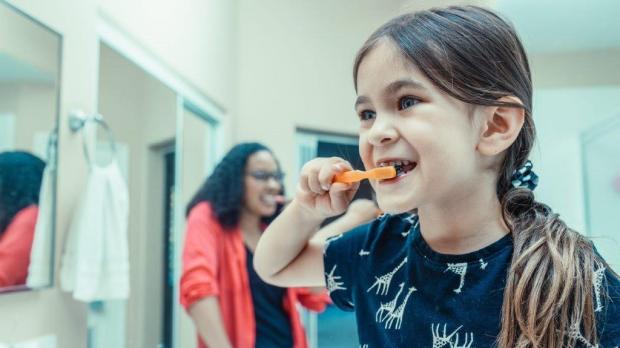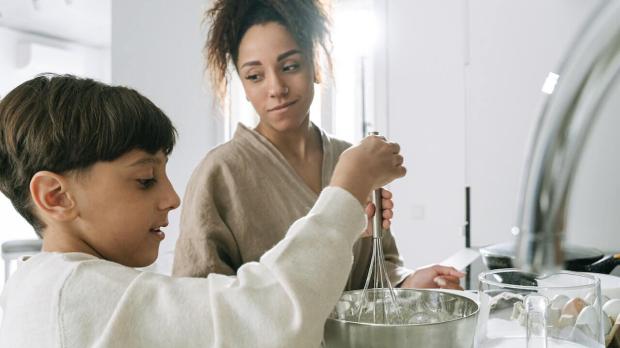Practical skills to help you look after a sick child
Our short skills videos bring together real-life experience and trusted medical expertise to help you feel confident caring for your child’s health. Filmed with our sessional GP and Mum Amina Al Yassin, alongside our paediatrician and mum Prof. Monica Lakhanpaul, each video offers practical demonstrations and clear, step-by-step guidance on everyday health concerns. Topics include:
- What to do if your child has a fever.
- Giving fever medication safely.
- How to take your child’s temperature.
- Using saline nose drops or spray.
- Spotting and treating dehydration.
- Understanding bronchiolitis.
Whether you’re a first-time parent or looking for a quick refresher, these videos are here to give you practical, reassuring support when you need it most.
What is the Measles, Mumps and Rubella (MMR) immunisation?
The Measles, Mumps and Rubella, or MMR, vaccine protects against three highly infectious diseases:
These diseases spread easily between unvaccinated people and can cause serious health problems.
Why should I get my child vaccinated?
Measles, mumps and rubella spread easily between people and can lead to serious problems. For example, measles can cause blindness and meningitis. Mumps can lead to hearing loss although usually temporary. Rubella can cause problems in babies at birth such as with their heart, hearing, sight or brain.
Getting vaccinated helps to keep your child safe from these diseases. It also helps protect other people in your family and community who are unable to have the vaccine (such as pregnant women, unborn babies and people with weakened immune systems).
When should I get my child vaccinated?
The MMR vaccine is recommended for all babies and young children, but older children and adults can have it if they were not vaccinated when they were younger.
Babies and young children are given two doses of the MMR vaccine as part of the NHS vaccination schedule. They receive their first dose when they turn 1 year old.
Previously they received the second dose at 3 years 4 months old. However, on 1 July 2025 the NHS vaccination schedule changed.
- If your child was born on or after 1 July 2024, they will receive their first dose when they turn one and the second dose six months later, when they are 18 months old.
- If your child was born on or before 30 June 2024, they will still be offered their second MMR dose when they turn 3 years 4 months.
This might mean that you are offered your child’s second dose of the MMR vaccination at a different appointment to that in your child’s ‘Red Book,’ or to give it its official name, the Personal Child Health Record (PCHR). You should have been given a Red Book shortly before or after your baby was born. If you haven’t been given one, or if you’ve misplaced yours, contact your health visitor or GP surgery to find out what to do.
These changes to the vaccination schedule are based on clinical advice and are the best way to protect your child from measles, mumps and rubella. Please continue to book your child’s vaccination appointments when you receive your invite from their GP. If you have any questions or concerns, don’t hesitate to speak to your GP Practice or your healthy visitor.
The information in this video about when MMR vaccinations take place is based on the schedule for children born on or before 30 June 2024.
Seasonal illnesses
During winter, there is often a rise in coughs and colds among children. These infections are common and easily treated, but some are more serious. You know better than anyone else what your child is usually like, so you’ll know when something is seriously wrong. It’s important to trust your instincts if your child is unwell. Get medical help if you think you need it.
We’ve developed advice to help you understand the key symptoms to look out for, what you can do to take care of your child and when to seek help.
This website has lots more advice about keeping your family healthy and happy, as does the NHS Healthier Together website.
Bronchiolitis and RSV information is also available in Urdu (اردو), Somali (Soomaali), Punjabi (ਪੰਜਾਬੀ), Bengali (বাংলা), Hindi (हिंदी), Portuguese (português), Ukrainian (український), Arabic (العربية), Polish (polskim) and French (français).
Strep A information is also available in Urdu (اردو), Somali (Soomaali), Punjabi (ਪੰਜਾਬੀ), Bengali (বাংলা), Hindi (हिंदी), Portuguese (português), Ukrainian (український), Arabic (العربية), Polish (polskim) and French (français).
Asthma
This free training covers the skills and knowledge needed to safely care for a child or young person with asthma. It's ideal for parents and carers, as well as professionals such as those working in education, health and non-healthcare roles. Follow the link below, scroll down to Tier 1 and start there.



